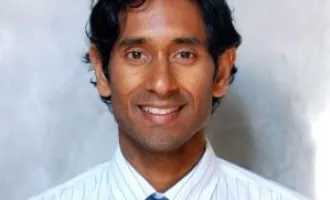The Meaning in Our Mental Health
Somewhere around 6 a.m. the other morning, I stood at the kitchen counter, bleary-eyed and in nothing but briefs, steam rising around me.
A well-worn pot of water simmered for my morning oatmeal, alongside an electric kettle gurgling piping-hot water for coffee. Steam from the bathroom signaled it was time to jump in the shower, a routine that helped clear (along with my caffeine and Quaker Oats fix) the toxins of sleep deprivation fogging up my senses and sense of self.
Another daybreak in my medical training.
The vapors of my morning ritual struck me as a good way to introduce the mental health in health sciences series that I will be writing here in the pages of Synapse for you, my good (and hopefully better rested) reader.
Like water put to flame, much is bubbling up in terms of mental health this month, both on our campus and in the wider healthcare community.
The watched pot of medical resident work-hour restrictions and shift limits is beginning to boil over into big-time research articles on the experience of thousands of residents in head-to-head comparisons of different work schedules.
UCSF medical students are meeting in auditoriums and classrooms to discuss the “Suffering in Silence” that occurs when students hide their mental struggles while trying to keep up with intense study and clinical rotations.
Our school administrators, faculty and peers are telling us “It’s Okay To…” acknowledge these challenges, this suffering, this prevalence of mental health concerns in our community, as the slogan of the Mental Health Matters campaign sponsored by UCSF Student Health and Counseling.
All around us, perhaps as closely as our own thoughts and feelings, we can feel the heat of high-pressure education and training: mental unease and its more clinically-defined cousin, mental disease, are already large but under-recognized and under-treated players in all societies.
They take on unique forms and have unique consequences when they spread through the people that make up the medical system.
Some consequences of this spread come to us as statistics: according to the American Foundation for Suicide Prevention, physicians in the U.S. die by suicide at two to three times the national average, roughly one death per day. A study in the journal Academic Medicine reported that around 10 percent of fourth-year medical students and first-year residents report having recent suicidal thoughts.
The same holds for graduate students. A landmark report by the Graduate Assembly at UC Berkeley in 2005 found that 10 percent of their graduate students had contemplated suicide, while a follow-up report released last year found that about half of Berkeley graduate students likely suffer from depression.
Adding insult to these psychological injuries, a recent meta-analysis of studies on barriers to mental health care found that health professionals had the highest stigma-related barriers to seeking mental health care, such as shame and negative social judgment, of all professional groups analyzed.
Behind those statistics are the uncountable stories of mental health within individuals and groups: the students whose struggles with mental illness inspired their path into health sciences or helped mold the compassion at the heart of their caregiving; the miscommunications and toxic dynamics in health care teamwork that are more attributable to an inability to routinely talk about and reflect on issues of distress, rather than the personal failings of any individual.
Often the fuel behind health professionals behaving badly, their so-called “unprofessional behavior,” is burnout, a stress-related syndrome of emotional exhaustion, disengagement or reduced performance that has been associated with unprofessional conduct and less altruistic professional values in medical students.
Better shift schedules, less burdensome busy work, and sustained departmental support for the mental health care of PhD’s, MD’s, RN’s, NP’s, DDS’s, SW’s and other allied health professionals could go a long way towards improving our collective mental health here at UCSF and at other institutions.
Ultimately, the tasks of aiding those in sickness, distress and dying will never be easy or clean cut: Living is messy business, and so are the health sciences and practices that attempt to prolong, ease or explain this life.
This series will be about some of the people and ideas that are aimed specifically at making meaning of our mental health from here on the gritty inside of the health system.
My goal for this column is to condense the projects and candid real-life experiences of fellow students and trainees into a story you can sit with for a moment before you dive back into your intense work or study.
Perhaps, these writings will spur you to reach out to a peer in need or ask for help yourself: you can call Student Health and Counseling at (415) 476-1281 (press option 7 for the Mental Health Crisis Line) or walk into either of their locations at Parnassus or Mission Bay during business hours for a confidential mental health consult.
At the very least, I hope they will give you something to think about while you’re in the shower, or waiting for a pot to boil, or braving the fog that periodically roils our city. Mental health, like water, is everywhere around us, rising, falling and transforming its shape and state in response to the energy of the world around it.


